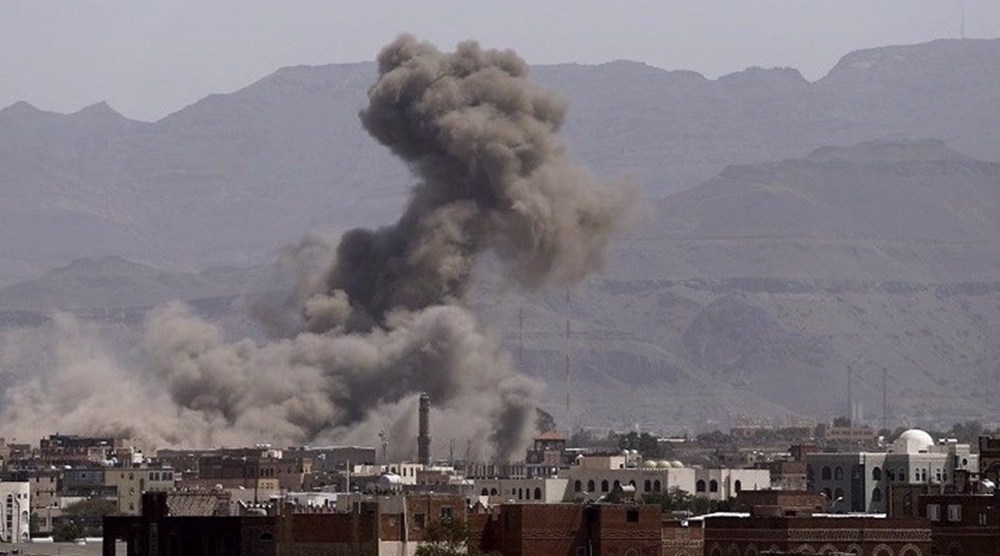AhlulBayt News Agency (ABNA): Over the past few days, Saudi Arabia stepped up its airstrikes in Yemen. The attacks, coming in front of eyes of a world watching the Saudi crimes against the civilians since 2015, have targeted Ma'rib, the capital Sana'a, Al-Jawf, and Sa'ada provinces.
Yemen's Al Masirah news network reported on Friday that Saudi bombers bombed Al-Wadi and Al-Juba towns in Ma'rib province 28 times.
According to the report, Saudi coalition fighters attacked Khab wa ash Shaf district in Al-Jawf five times, twice Yemeni border areas with Najran province, and twice the outskirts of Al Mahwit city, killing three civilians, including two children and injuring seven others.
Saudi coalition's artillery, too, targeted areas in the border city of Sa'ada north of the country.
Sana'a has not been calm in recent nights. Along with its outskirts, it has been the target of heavy airstrikes, unprecedented in recent months. Al Masirah reported that the aggression coalition twice attacked Al-Libi district in Ma'ain county of the capital Sana'a on Sunday night. Over the past week, Saudi warplanes bombed Sana'a International Airport as well as the city's main stadium.
But behind the massive airstrikes in recent days, one can see a number of goals and motives, all indicating the Saudi coalition's desperation and confusion over the developments on the battlegrounds and the stalemate that Riyadh is in at the end of the seventh year of the war.
Taking revenge of the defeat on the civilians
Undoubtedly, Ansarullah's military successes in recent months on various fronts in the fight against the Arab coalition and its mercenaries have played an important role in angering the Saudis, motovating Riyadh to carry out insane and brutal reactions targeting the civilians by blind bombing of the cities.
Oil-rich Ma'rib is now under full encirclment of Ansarullah and the coalition forces and their mercenary allies are to accept a big defeat in the war that can make more difficult the war conditions for them, despite Saudi tricks ranging from showing favor in political initiatives and negotiations to full use of military force to check the resistant movement's progress on the battleground.
Meanwhile, Ansarullah's military victories in the provinces of Al-Jawf, Hijjah, and the west coast have added to the failure of the Saudi coalition and the failure of its political and military plans for the future. In particular, the complete liberation of Al-Jawf, which seems to have been fully achieved by recent military operations, will deal a fatal blow to the coalition body as any group dominating Al-Jawf controls the current battle in Yemen, especially in the five vital provinces of Amran in the west, Sana'a in the southwest, Ma'rib in the south, Hadhrahmaut in the east, and Sa'ada in the north of Al-Jawf.
Al-Jawf shares long borders with Saudi Arabia, which eventually prompted Riyadh to engage in "peace consultations" with Sana'a to keep the Shaybah oilfield in Empty Quarter desert safe from missile and drone strikes.
On the other hand, and perhaps most importantly, the occasional ground and air attacks by the Yemenis on Saudi soil have become a nightmare that has grabbed the calm of Saudis. In recent days, the Yemenis have re-launched operations inside Saudi Arabia in Jazan province, exposing Riyadh's military inability to defend its borders and maintain its territorial integrity as the war continues.
Fear of negotiating with empty hands
Saudi cities and strategic sites are at constant risk of Yemeni missile and drone strikes. Therefore, given the current situation and developments in the field, Riyadh rulers d not have the power to impose their own conditions which Sana'a rejects and Riyadh insists on. But time does not seem to be in Saudi Arabia's favor.
Actually, as foreign pressure mounts on Saudi Arabia to end the war, along with a stalemate in military plans, the Saudis find themselves forced to sit at the negotiating table. Naturally, in negotiations, the one who has the upper hand in the war has more maneuvering power to impose conditions on the opposite side. The conditions of the war, as described, are not at all favorable for the Saudis, and Riyadh is desperately trying to change the conditions of the war by carrying out large-scale and blind air strikes.
Scorched earth strategy
Since the Saudi-led coalition invaded the already impoverished country in 2015, the destruction of Yemen's economic infrastructure has been a major goal of the operation, with the World Bank suggesting Yemeni infrastructure damage reaching $8.5 billion.
Saudi Arabia's main goal at the beginning of the Yemeni war was to prevent the emergence of a strong Yemen in the Arab Peninsula so that the Saudis would continue to dominate the country. "Scorched earth" strategy has been one of the most important elements of such a agenda.
Now with defeat indicators of Arab-American alliance showing themselves in the war, the Arab coalition has reactivated over the past days its scorched earth strategy against all ethics of war and international laws, attacking residential areas of Sana'a.
The strikes of the fighter jets of the coalition on the residential areas of the capital have caused a lot of damage to the houses of citizens and sensitive sites like hospitals and the destruction of a number of roads and bridges. The Saudi regime seeks to leave as much of a major economic crisis as possible for the Ansarullah administration in Sana'a for post-war period in order to create the conditions for a political crisis and weaken the foundations of the movement's popular legitimacy.
/129
source : Al Waght News
Wednesday
29 December 2021
6:39:11 AM
1213458

Over the past few days, Saudi Arabia stepped up its airstrikes in Yemen. The attacks, coming in front of eyes of a world watching the Saudi crimes against the civilians since 2015, have targeted Ma'rib, the capital Sana'a, Al-Jawf, and Sa'ada provinces.
